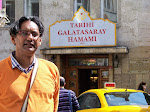A cha chaan teng is a type of Chinese tea restaurant commonly found in Hong Kong, known for its eclectic and affordable menus which include many dishes from Hong Kong cuisine and Hong Kong-style Western cuisine.
This type of restaurant is also popular in Macau. Since the 1980s they can also be found in the Chinatown districts of many Western countries like Canada and the United States.
Cha chaan teng establishments provide tea (usually weak tea) called "clear tea" (清茶 cing1 caa4), to customers as soon as they are seated. Some patrons use the hot tea to wash their utensils. The name, literally "tea restaurant", serves to distinguish itself from Western restaurants that provide water to customers instead of tea. The "tea" in the name refers to the inexpensive black tea, not the traditional Chinese tea served in traditional dim sum restaurants and teahouses (茶樓 caa4 lau4). Moreover, some cha chaan tengs prefer the use of the word "café" in their names.
The "tea" may also refer to those tea drinks, such as the Hong Kong-styled milk tea and cold lemon tea, which are very popular in cha chaan tengs. The older generations in Hong Kong use yum sai cha (飲西茶 lit. "drinking Western tea"), when dining in these restaurants in contrast with yum cha.
Customers usually select their seats freely in a cha chaan teng, but in a crowded restaurant they may be given the choice of sharing a table with strangers. During peak hours, waiters in a cha chaan teng will seat their customers, "packing" as many customers into the restaurant as possible. This practice of sharing table is called dap toi (搭檯 daap3 toi2 Pinyin: dā tai) in Chinese. For example, they will seat two groups of three customers at a six-seat table, to avoid having a pair of customers sitting with a group of three people, leaving one seat vacant. Sometimes already-seated customers have to move to accommodate the business.
n most cha chaan tengs, customers call out their orders to a waiter, who will jot down the prices of the ordered food (sometimes also the names of the food in local short forms; for instance, lemon tea is recorded as "0T", see simplifications on written Chinese in Hong Kong for details) on a piece of card/paper provided to every group of customers. After the meal, customers present the card/paper at the cash register to pay the bill.
Subscribe to:
Post Comments (Atom)





No comments:
Post a Comment